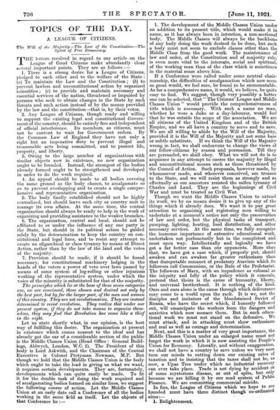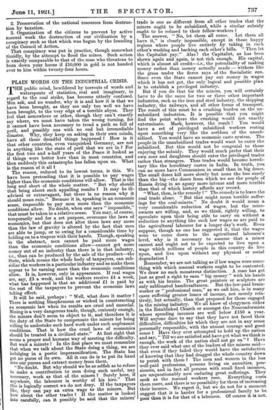TOPICS OF THE DAY.
A LEAGUE OF CITIZENS.
The Will of the Majority—The Law of the Constitution—The Spirit of Free Democracy.
THE letters received in regard to our article on the League of Good Citizens make abundantly clear several important points. They are as follows :- 1. There is a strong desire for a League of Citizens, pledged to each other and to the welfare of the State : (a) To maintain the Law and the Constitution ; (b) to prevent lawless and unconstitutional action by organized minorities ; (c) to provide and maintain necessary and essential services of the nation, threatened or impaired by persons who seek to obtain changes in the State by such threats and such action instead of by the means provided by the law and the constitution—that is, by their votes. 2. Any League of Citizens, though ready and willing to support the existing legal and constitutional Govern- ment of the country, should be entirely free and independent. of official interference. Its members, as citizens, must not be content to wait for Government orders. By the Common Law of England they have not only a right but an imperative duty to prevent illegal and treasonable acts being committed, and to protect life, property, and liberty. 3. Owing to the large number of organizations with similar objects now in existence, no new organization ought to be founded. Instead, the strongest of the bodies already formed ought to be strengthened and developed in order to do the _work required.
4. An appeal should be made to all bodies covering the same ground as the body chosen, to amalgamate so as to prevent overlapping and to create a single compre- hensive and representative organization. 5. The body finally established should not be highly centralized, but should leave each city or country unit to manage its own affairs. At the same time, the central organization should always be ready to help in the work of organizing and providing assistance to the weaker branches. 6. The organization, central and local, should not be affiliated to or under the influence of any one party in the State, but should in its political action be guided solely by the determination to keep the country on con- stitutional and legal lines, and to resist any attempt to create an oligarchical or class tyranny by means of Direct Action, rather than by the law of the land and the votes of the majority.
7. Provision should be made, if it should be found necessary, for constitutional machinery lodging in the hands of the voters a power of veto over laws passed by means of some system of log-rolling or other injurious working of the representative system, under which the voice of the minority is substituted for that of the majority. The principles which lie at the base of these seven categories are, we are convinced, those chosen and desired not only by the best part, but by far the larger part, of the men and women of this country. They are not revolutionaries. They are instead determined to resist revolution. They realize that under our present system, if they do not take means to organize them- selves, they may find that Revolution has come like a thief in the night.
Let us state shortly what, in our opinion, is the best way of fulfilling this desire. The organization at present in existence which comes nearest to the ideal and has already got the ear of a considerable section of the public is the Middle Classes Union (Head Office : General Build- ings, Aldwych, London, W.C. 2). The President of this body is Lord Askwith, and the Chairman of the Central Executive is Colonel Pretyman Newman, M.P. But though we hold that the Middle Classes Union is the body which ought to take the lead in giving us what we want, it requires certain developments. They are, fortunately, developments which can quite easily be made. To fit it for the double task of doing the work required and of amalgamating bodies formed on similar lines, we suggest the following course of action. Let the Middle Classes Union at an early date call a Conference of all the bodies working in the same field as itself. Let the objects of that Conference be :— 1. The development of the Middle Classes Union under an addition to its present title, which would make it in name, as it has always been in intention, a non-sectional body. The Middle Classes will always be the backbone of any body doing the work desired to be done, but such a body must not seem to exclude classes other than the Middle Class from the good work. The maintenance of law and order, of the Constitution and of majority rule, is even more vital to the interests, social and spiritual, of the working man than of the class which is sometimes in the material sense above him.
If a Conference were called under some neutral chair- manship, the difficulties of amalgamation which now seem so great would, we feel sure, be found to be surmountable. As for a comprehensive name, it would, we believe, be quite easy to find. We suggest, though very possibly a better one can be selected, that " The Citizens' League and Middle Classes Union " would provide the comprehensiveness of title which is necessary. With such a name no man, whether he were a duke or a day-labourer, would feel that he was outside the scope of the association. We are all citizens of the United Kingdom and of the British Empire, and we all have a country to serve and to save. We are all willing to abide by the Will of the Majority, provided it is the Will of the Majority and not some base or subtle substitute. If we think the Will of the Majority wrong in fact, we shall endeavour to change the views of our fellow-citizens by reason and persuasion. Till they are persuaded, we shall obey. What we will not do is to acquiesce in any attempt to coerce the majority by illegal and unconstitutional means such as those threatened by the Council of Action. Such proposals, however made, by whomsoever made, and wherever conceived, are treason to the State, and we will resist them as strongly and as effectually as our ancestors resisted the sullen tyranny of Charles and Laud. They are the beginnings of Civil War and must be treated as Civil War.
Though we want the Middle Classes Union to extend its work, we by no means desire it to give up any of the things which it already does. We want it to pay great attention to organizing and registering men willing to undertake at a moment's notice not only the preservation of law and order, but the physical tasks of transport, pumping, lighting, heating, food distribution, and other necessary services. At the same time, we fully recognize the immense importance of extensive educational work, undertaken not perfunctorily but in the completest and most open way. Intellectually and logically we have got a far better case than our opponents. More than that, we have got a case which, if properly put, should awaken and can awaken far greater enthusiasm than that disreputable remanet of predatory Atavism which its followers call Communism, or the Rule of the Proletariat. The followers of Marx, with an impudence as colossal as the iniquity and folly of the policy which it conceals, pretend that theirs is the cause of humanity, liberty, and universal brotherhood. It is nothing of the kind. Ours and ours alone is the cause through which deliverance may come to a world upon the rack. It is we, not the disciples and imitators of the bloodstained Soviet of Russia, who have the secret which, if honestly followed out, will emancipate the workers from the dangers and anxieties which now menace them. But in such educa- tional work we must not stand on the defensive. We must attack, and in attacking must show enthusiasm and zeal as well as courage and determination. Next, and this is a matter of very great importance, the Middle Classes Union under an enlarged name must not forget the work in which it is now assisting the People's Union for Economy. Literally, and without exaggeration, we shall not have a country to save unless we very soon turn our minds to cutting down our existing rates of taxation and to insisting that the taxes shall not be, as now, a Upas Tree under which no industrial recovery can ever take place. Trade is not dying by accident or of some mysterious disease, or out of spite, but only because we are killing it by our mad system of Public Finance. We are committing commercial suicide. In fine, the League of Citizens which we hope to see founded must have three distinct though co-ordinated aims:- 1. Enlightenment. 2. Preservation of the national resources from destruc- tion by taxation.
3. Organization of the citizens to prevent by active manual work the destruction of our civilization by a conspiracy such as that which was begun by the founding of the Council of Action.
That conspiracy was put in practice, though somewhat timidly, by the attempt to flood the mines. Such action is exactly comparable to that of the man who threatens to burn down your house if £10,000 in gold is not handed over to him within twenty-four hours.



































 Previous page
Previous page